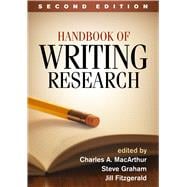The definitive reference in the field, this volume synthesizes current knowledge on writing development and instruction at all grade levels. Prominent scholars examine numerous facets of writing from sociocultural, cognitive, linguistic, neuroscience, and new literacy/technological perspectives. The volume reviews the evidence base for widely used instructional approaches, including those targeting particular components of writing. Issues in teaching specific populations--including students with disabilities and English learners--are addressed. Innovative research methods and analytic tools are clearly explained, and key directions for future investigation identified.
New to This Edition
*Chapters on genre instruction, evaluation and revision, argumentative writing, computer-based instruction, and professional development.
*Chapters on new literacies, out-of-school writing, translation, and self-regulation.
*Many new topics and authors, including more international perspectives.
*Multiple chapters connect research findings to the Common Core writing standards.
See also Best Practices in Writing Instruction, Third Edition, edited by Steve Graham, Charles A. MacArthur, and Michael Hebert, an accessible course text and practitioner's guide.
New to This Edition
*Chapters on genre instruction, evaluation and revision, argumentative writing, computer-based instruction, and professional development.
*Chapters on new literacies, out-of-school writing, translation, and self-regulation.
*Many new topics and authors, including more international perspectives.
*Multiple chapters connect research findings to the Common Core writing standards.
See also Best Practices in Writing Instruction, Third Edition, edited by Steve Graham, Charles A. MacArthur, and Michael Hebert, an accessible course text and practitioner's guide.








